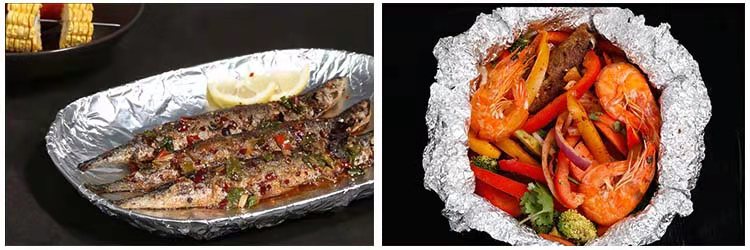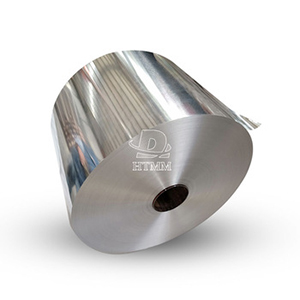What is 8011-O Aluminum Foil
8011-O aluminum foil is a very commonly used food-grade aluminum foil. The "8011" refers to the alloy composition standard, where 80% is aluminum and 11% is magnesium. The "O" refers to the purity level, meaning it is 99.5% pure aluminum.

8011-O aluminum foil has a shining silver color and is very thin and flexible. Its thickness is generally 6-12 microns. It can be easily torn by hand and molded to the shape of containers. Due to its thinness and ductility, 8011-O aluminum foil is widely used for food packaging, pharmaceutical packaging, cigarette packaging and other applications.
Manufacturing Process of 8011-O Aluminum Foil Large Rolls
The production process of large roll 8011-O aluminum foil is as follows:
Alloying and melting: Aluminum ingots are weighed and alloyed according to the 8011 composition standard in a large furnace. Magnesium is usually used as the main alloy element to enhance the strength and corrosion resistance. Other alloy elements such as manganese may also be added. The molten aluminum alloy is homogenized and degassed to remove impurities and inclusions.
Continuous casting: The molten aluminum alloy is cast into a rolling ingot by a continuous casting machine. The ingot has a rectangular cross section suitable for hot rolling.
Hot rolling: The rolling ingot is heated to 400-500°C and fed into a tandem cold mill for multi-pass rolling. The thickness is gradually reduced from tens of millimeters to around 3 mm. This produces an intermediate product coil.
Cold rolling: The intermediate product coil is uncoiled and fed into a cold rolling mill for multi-pass rolling at room temperature. The thickness is reduced to the final gauge, usually 6-12 microns. Lubricants are applied to facilitate rolling.
Annealing: The cold rolled foil is coiled and sent to an annealing furnace. It is heated to 350-450°C to soften the material and relieve internal stresses from rolling.
Slitting and inspection: The annealed foil coil is uncoiled and slit to the desired width, usually 1-2 meters. Automated gauges and inspection systems check foil properties and thickness accuracy.
Packaging: Qualified aluminum foil is re-coiled onto a large core to form the final product - 8011-O aluminum foil large rolls. They are wrapped and labelled, and kept in warehouses before shipment.
Why can 8011-O Large Aluminum Foil Rolls Come into Direct Contact with Food?
There are several key reasons why 8011-O aluminum foil rolls are approved for direct food contact:
Purity - 8011-O foil meets the high purity standard of 99.5% aluminum content. Impurities are strictly controlled to below safety limits set by food safety authorities. This ensures no harmful substances can leach out.
Inertness - Aluminum is chemically inert and non-toxic. It does not react with or contaminate food under normal use conditions. Aluminum also provides an effective barrier to prevent transfer of odors, moisture, and other contaminants.
Resistance to corrosion - The magnesium alloying element and annealing process impart good corrosion resistance to 8011-O foil. It maintains its integrity and does not develop pits or crevices where bacteria can grow, even after long term or repeated use.
Non-absorbent - Aluminum foil is non-porous and highly impermeable. It does not absorb or retain food components, flavors, odors, grease or other substances over time from successive uses.
Heat resistant - Foil can withstand heat from baking, boiling, steaming, microwaving or grilling of foods without undergoing chemical changes. This stability further reduces risk of contamination.
Inert lubricants - Rolling lubricants used are food-grade, and any trace amounts are rendered inert by the high annealing temperature. They present no hazard to food.
Rigorous testing - 8011-O foil is extensively tested under accelerated conditions to confirm its suitability for prolonged direct contact with all types of food including acidic, fatty and dry foods. It passes all criteria for purity, strength and barrier performance.
Approval by authorities - Based on the above properties and test results, international food safety agencies such as FDA, EU and CFDA have approved the use of 8011-O aluminum foil in direct contact with all types of food including those consumed without heating.
The Origin of 8011-O Aluminum Foil Rolls
 The earliest aluminum foil production dates back to the 1880s. However, it was in 1910 when a rolling mill was first set up in Switzerland for mass production of aluminum foil utilizing new rolling and annealing technologies. Today, aluminum foil has become ubiquitous in food packaging applications worldwide.
The earliest aluminum foil production dates back to the 1880s. However, it was in 1910 when a rolling mill was first set up in Switzerland for mass production of aluminum foil utilizing new rolling and annealing technologies. Today, aluminum foil has become ubiquitous in food packaging applications worldwide.8011 aluminum alloy foil was developed in the 1950s as a standard composition for food contact applications. The "8011" designation was coined by the Aluminum Association, one of the first industry organizations promoting aluminum products.
Through continuous improvement in alloying, casting, rolling and annealing methods over decades, 8011-O foil has achieved very high purity with consistent properties necessary for direct food contact. Strict compositional and performance standards are now defined by regulatory bodies.
A major breakthrough was the development of large roll production in the 1980s. Using advanced equipment and automation, specially engineered production lines can produce 8011-O foil rolls up to 2 meters wide and weighing several tons. This enables bulk, low-cost packaging and higher productivity for food manufacturers.
Today, leading aluminum foil producers around the world Massively supply high quality 8011-O foil to meet growing global demand from the food industry. With enhancements in barrier qualities, 8011-O foil is increasingly replacing other packaging materials in new applications.
Advantages and Performance of 8011-O Aluminum Foil
Besides being food-safe, 8011-O aluminum foil offers a unique combination of properties that make it highly suitable for various food packaging applications:
Impermeability - Acts as an excellent barrier to moisture, gases, flavors and residues, protecting food longer. Oxygen transmission rate is less than 1 cc/m2/day.
Thermal stability - Withstands temperatures from boiling to baking without melting or undergoing chemical changes, maintaining food quality.
Durability - Resists cuts, punctures or damage during normal use even with sharp or pointed food items. Can be heated, folded and crimped repeatedly.
Shiny appearance - Gives an attractive mirror finish appealing to consumers. Non-porous surface resists soiling and staining.
Malleability - Can be easily formed into bags, wraps, trays or other formats without cracking or tearing due to thin but strong properties.
Lightweight - Adds little weight to packaged food, reducing transportation costs.
Recyclable - Entirely recyclable without loss of material properties, promoting sustainability.
Cost-effective - Provides a highly effective barrier at low prices, making it economical for wide applications in food preparation and storage.
The unique combination of aluminum's corrosion resistance, impermeability, heat tolerance and flexibility in 8011-O foil has helped it become the packaging material of choice for a variety of foods. It helps extend shelf-life while meeting all food safety standards.
Advantages of 8011-O Aluminum Foil Large Rolls from HTMM Aluminum Foil Manufacturer
 HTMM is a leading manufacturer of 8011-O aluminum foil supplying large rolls to major food brands and retailers globally. Here are some key advantages of its heavy gauge foil products:
HTMM is a leading manufacturer of 8011-O aluminum foil supplying large rolls to major food brands and retailers globally. Here are some key advantages of its heavy gauge foil products:Premium purity - Manufactured in state-of-the-art facilities with strict controls to maintain composition over 99.5% aluminum.
Consistent properties - Advanced casting, rolling and annealing lines ensure uniform thickness, strength and barrier performance roll to roll.
Wide widths - Produced in maximum widths up to 2 meters on high speed production lines for bulk packaging needs.
Heavy weights - Rolls weigh between 1 to 5 tons for economies of scale in converting and filling operations.
Anti-stick coating - Optional non-stick coatings prevent food from sticking and enable clean peelability.
Special surfaces - Products include PVdC coated, acrylic wash coated or slip coated varieties for enhanced barriers or printability.
Certifications - Manufacturing facilities approved for BRC, FDA, Halal etc. ensuring top food safety standards.
Logistics expertise - Global warehousing and preferred freight rates for just-in-time inventory management.
Customization support - Dedicated R&D helps modify foil thickness, width or surfaces to meet any specialized requirements.
Stability - As one of the oldest aluminum producers, ensures long term supply reliability through strategic raw material sourcing.
Large rolls of premium quality 8011-O foil enable customers to gain significant cost savings through minimized waste and efficient processing. Their properties and food safety substantially expand viable packaging applications.

